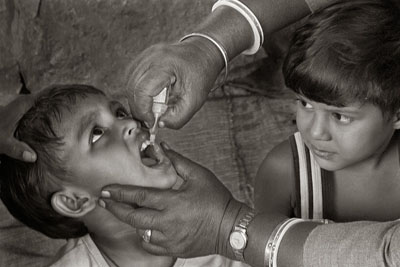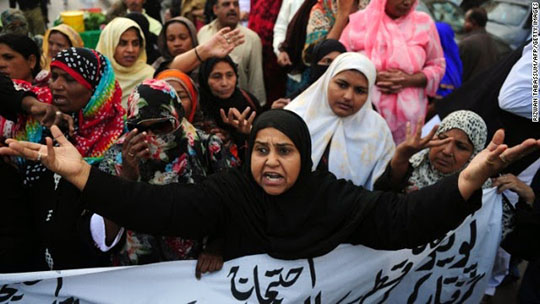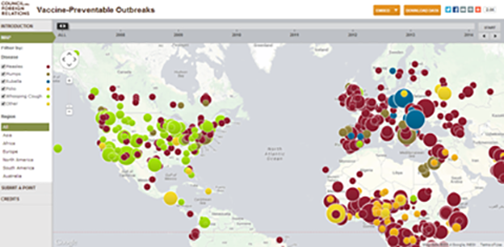What's all this fuss about polio?
On Monday the World Health Organization (WHO) declared the spread of polio an “international public health emergency.”1
Now, some of you must be scratching your heads. Huh? Didn’t we get rid of polio over 30 years ago? Sure, in the United States we haven’t had to deal with the disease since 1979 (coincidently the same time the U.S. last had a working embassy in Tehran), but around the world, cases of polio still plague some countries, and the situation has taken a turn for the worse. The cause for alarm comes from countries like Pakistan, Syria, and Cameroon from where polio has leaked over the borders to neighboring Afghanistan, Iraq, and Equatorial Guinea, respectively, making it an international problem. To exacerbate this, the spread comes during what is known as “low transmission season” which is from January through April.1
So what is polio? Poliomyelitis is a contagious disease caused by the poliovirus that can result in infantile paralysis and in very severe cases, death. Most people infected with this virus never even show symptoms, but for those who do there are both nonparalytic and paralytic forms. The paralytic type unfortunately affects the spinal cord or brainstem (or both) and this could lead to loss of muscle function, paralysis, etc. Health effects such as muscle and joint pain can be seen later on in life as well.2 Is there a way to prevent this? Sure is! Vaccines, administered both in the forms of shots and oral drops, are given to children worldwide to develop early immunity to the effects of this virus.

Recently some surprising sources have exacerbated this spread of polio. As if it hadn’t bred enough ill will for the United States, the war on terror has had a profound negative impact on polio vaccinations. Drone strikes in mountainous Waziristan (a pretty troubled part of Pakistan) resulted in a 2012 Taliban ban on polio vaccination workers from going there, impacting around 240,000 Pakistani children.3
Furthermore, the civil war in Syria has made things worse for both the Syrian people and their led to refugees fleeing to neighboring Iraq and taking the virus with them across the border, the first time in 14 years for it to show up in Iraq. Polio wasn’t a problem while our troops were there from 2003-2011, but now that the region is unstable, the public health systems there have been taxed to keep up with the vaccinations.4

Some Good News, Finally.
Despite the grim statement from the WHO, not all is bleak in the fight against polio. March 27, 2014 was a momentous day: the WHO officially certified India as “polio-free.”5 Having been born in India, the news that no new polio cases had been recorded in the past 3 years was particularly exciting for me because I’ve seen firsthand the impact polio has on the daily lives of people there. One of the key factors in India’s success was the aggressive targeting of underserved and marginalized communities, something that could benefit other countries attempting to fight polio as well6….And it seems that people in Pakistan took note of this. A great recent articles talks about the “Angels of Karachi,” fearless women who risk their lives to inoculate children against polio. Their colleague have been shot and killed, but still these brave women rise to meet the health needs of hard-to-reach areas.7 Real talk, props to their goodness, an inspiration for us all.

Polio can also do good for people medically. When I was looking up sources for this post, I found a really cool news article from South Carolina. A genetically modified poliovirus by the Duke University Medical Center killed off brain tumor cells in a 23-year-old woman. Oncologists had already tried the works, and finally, when nothing seemed to be working, they asked if she wanted to try this new experimental treatment. With nothing to lose, she agreed, and the results were astounding. Months later MRIs show that other than some scar tissue there’s no evidence of the tumor.8 So see, glass half full, right?
Vaccinate Your Kids, People.
Finally, last week (April 24-30) was the WHO’s World Immunization Week, and I wanted to use this occasion to highlight the importance of vaccinations in today’s world. The spread of polio is entirely preventable by vaccination, and the fact that new cases are popping up in around 10 countries shows that we need to redouble our efforts to fight this.
What’s also disturbing is that diseases like measles, mumps, and rubella (again all preventable by vaccination) are showing in cities all over industrialized countries like America because some people have suddenly decided that vaccines are bad. Succumbing to baseless assertions that vaccines cause autism (seriously? go see the evidence people) or have dangerous preservatives (thimerosal was recognized as safe, but phased out from vaccines to allay fears), a new movement of anti-vaxxers has arisen. People have taken exemptions to school-required vaccinations based on religious and personal beliefs, and honestly no one is doing their kids any benefit with this.9, 10

Don’t believe me? Check out this supercool, interactive map from the Council of Foreign Relations: click here. As you can see the map shows outbreaks of preventable diseases in places of the world we’d consider pretty well vaccinated. Take-away from this: vaccinate your kids, convince weird people who don’t vaccinate their kids to do so, and donate money to increase polio vaccinations around the world. If there easily preventable diseases in the world, why not just prevent them?
References
1. Hayes, Ashley. "WHO Sounds Alarm on Spread of Polio." CNN. Cable News Network, 5 May 2014. Web. 5 May 2014
2. "Polio." Mayo Clinic. Mayo Clinic, n.d. Web. 07 May 2014.
3. Boone, Jon. "Taliban Leader Bans Polio Vaccinations in Protest at Drone Strikes."Theguardian.com. Guardian News and Media, 26 June 2012. Web. 07 May 2014.
4. Gladstone, Rick. "Polio Spreads From Syria to Iraq, Causing Worries." The New York Times. The New York Times, 07 Apr. 2014. Web. 08 May 2014.
5. Park, Madison. "Global Health Success: India Certified Free of Polio." CNN. Cable News Network, 27 Mar. 2014. Web. 06 May 2014.
6. Burki, Talha. "India After Polio." The Lancet: Infectious Diseases 4.4 (2014): 274-75. Elsevier. Web. 5 May 2014.
7. Buncombe, Andrew. "Angels of Karachi: The Pakistani Women Who Risk Death Every Day to Vaccinate Children against Polio." The Independent. Independent Digital News and Media, 09 Sept. 2013. Web. 08 May 2014.
8. Boudin, Michelle. "Polio Virus Kills College Student's Brain Tumor." KSDK. N.p., 29 Apr. 2014. Web. 08 May 2014.
9. Kollipara, Puneet. "How the Anti-vaccine Movement Is Endangering Lives."Washington Post. The Washington Post, 05 May 2014. Web. 07 May 2014.
10. Sifferlin, Alexandra. "Here Are Some Diseases We're Seeing Thanks to Anti-vaxxers." Time. Time, 17 Mar. 2014. Web. 07 May 2014.
11. "Vaccine-Preventable Outbreaks." Council on Foreign Relations. Council on Foreign Relations, n.d. Web. 08 May 2014.
